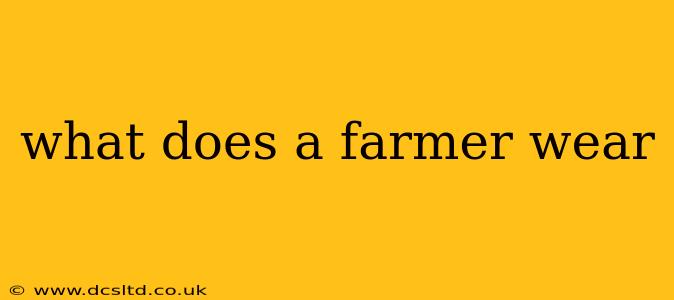What Does a Farmer Wear? A Comprehensive Guide to Farm Attire
Farmers' attire isn't just about fashion; it's about safety, comfort, and practicality in a demanding environment. What a farmer wears depends heavily on the season, the specific tasks being performed, and the type of farming. There's no single uniform, but rather a range of clothing items chosen for their functionality and protection. Let's explore the common elements of a farmer's wardrobe.
What kind of clothes do farmers wear in summer?
Summer farm work often means long hours under the sun. Lightweight, breathable clothing is key to staying cool and comfortable. Common choices include:
- Short-sleeved shirts: Often made of cotton or a moisture-wicking material to combat sweat. Many farmers opt for shirts with pockets for carrying small tools or supplies.
- Lightweight pants or shorts: Durable enough to withstand the rigors of farm work, but light enough to prevent overheating. Many farmers prefer denim or canvas pants, or breathable shorts made from quick-drying materials.
- Sun hats: Essential for protecting the face and neck from harmful UV rays. Wide-brimmed hats provide the best protection.
- Closed-toe shoes: Sturdy footwear is always necessary for protection from sharp objects, animal hooves, and potential spills. Boots are common choices for better ankle support.
What do farmers wear in winter?
Winter farm work presents its own set of challenges. Staying warm and dry is paramount, requiring layers of clothing to trap body heat and protect against the elements. Farmers often wear:
- Long-sleeved shirts: Often layered for additional warmth. Thermal underwear is a popular choice for extra insulation.
- Heavy-duty pants: Durable material like denim or canvas, often layered with thermal underwear beneath.
- Waterproof jacket and/or overalls: Essential for protection against rain, snow, and cold winds.
- Warm hat, gloves, and scarf: Protect exposed skin from the elements.
- Insulated boots: Waterproof and insulated boots are crucial for keeping feet warm and dry.
What kind of protective gear do farmers wear?
Regardless of the season, safety is always a top priority for farmers. Protective gear is essential for minimizing the risk of injuries. This includes:
- Safety glasses or goggles: Protect eyes from dust, debris, and chemicals.
- Hearing protection: Essential when operating loud machinery.
- Gloves: Protect hands from cuts, scrapes, and chemical exposure. Different gloves are used for different tasks (e.g., leather gloves for heavy work, nitrile gloves for chemical handling).
- Work boots: Steel-toe boots are often worn to protect feet from falling objects.
- High-visibility clothing: Particularly important when operating machinery or working near roads.
What kind of shoes do farmers wear?
As mentioned above, sturdy, durable footwear is crucial for farm work. The specific type of footwear depends on the task and the season. Common choices include:
- Work boots: Offer excellent ankle support, protection from sharp objects, and durability.
- Steel-toe boots: Offer added protection from falling objects.
- Rubber boots: Provide excellent water resistance and protection against mud and other wet conditions.
What are the different types of clothing worn by farmers?
The clothing a farmer wears varies widely based on the specific tasks they perform and environmental conditions. We've already touched upon many types; it's important to note the diversity in their attire. It ranges from lightweight summer shirts and shorts to heavy-duty winter jackets, overalls, and specialized safety gear. The clothing is always selected based on function and safety needs.
This guide provides a general overview; the specifics of a farmer's attire will always be influenced by their individual needs and the demands of their specific farming operation. Safety and practicality remain the overarching themes.
